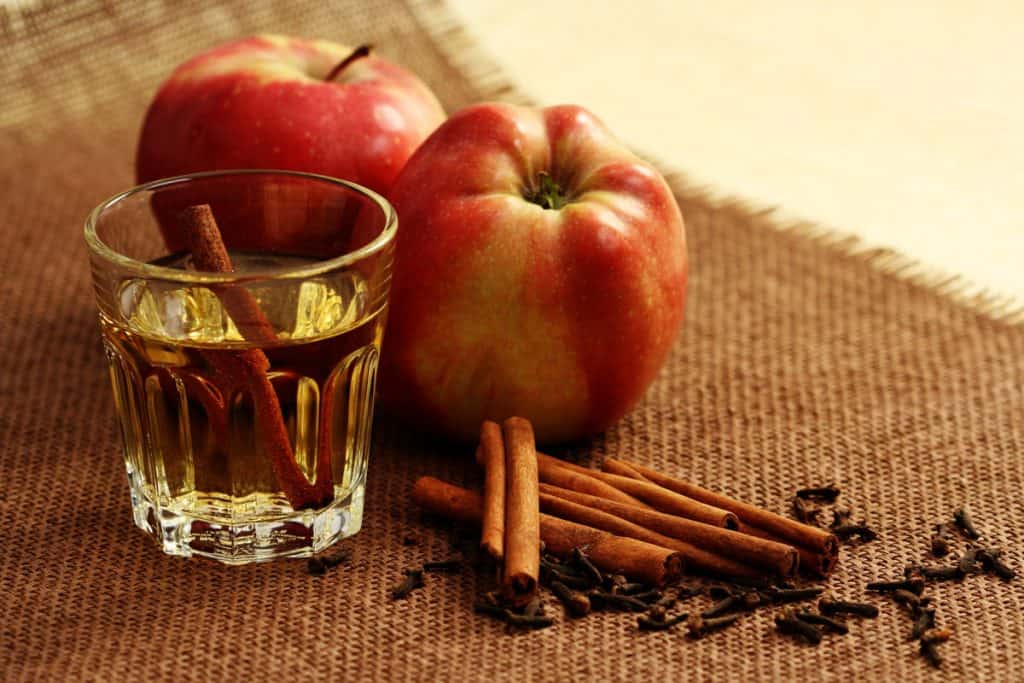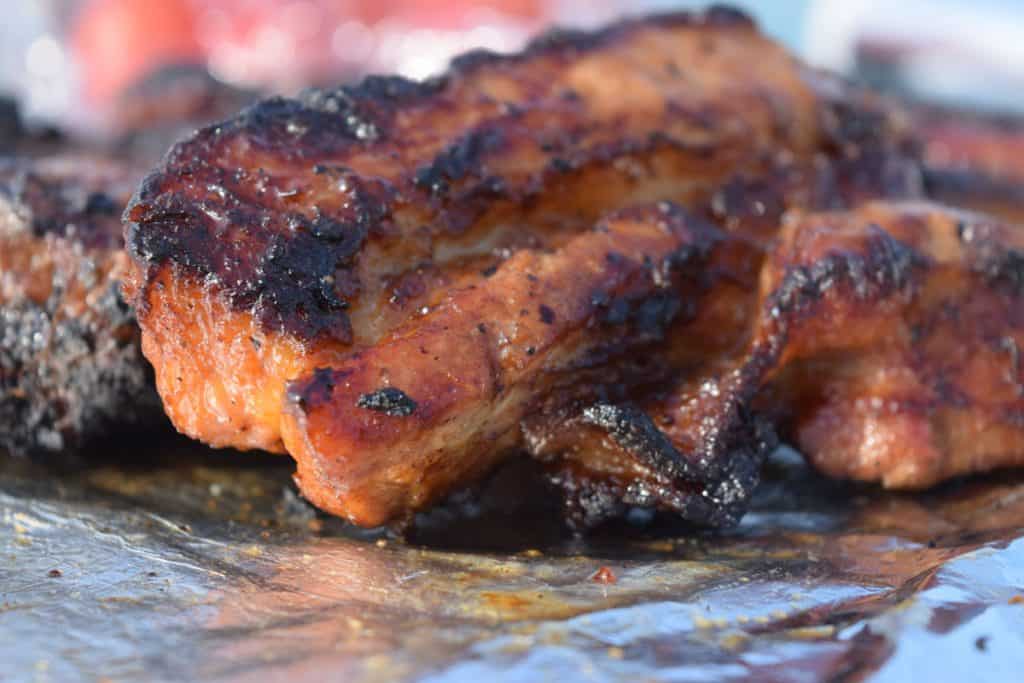Pork ribs are a barbecue staple, and with good reason. The succulent flesh contains just the right amount of fat, and they lend themselves well to a host of superb flavor combinations. However, the meat may dry out if you’re not careful. Here’s our primer on how to keep ribs moist when they’re cooked on the grill.
How To Keep Ribs Moist
The best way to keep ribs moist is to maintain a consistently low grill temperature. High heat will dry the ribs out in a heartbeat. You can also brine or marinate them beforehand, place a water pan in the grill or smoker, or enlist the aid of a mop sauce or spritzing liquid.
8 Methods For Keeping Ribs Moist
Brining
Soaking the ribs in a saltwater solution prior to cooking will help the meat retain moisture. The salt allows the muscle fibers to reabsorb fluids, so the ribs will be nice and juicy when you’re ready to serve them.
To make a brine solution, use a ratio of 1 tablespoon of kosher salt for every cup of fluid. Water generally makes up the bulk of the liquid, but it’s fine to substitute apple juice or cider, apple cider vinegar, or beer for some of it.
Try experimenting with different seasonings for the brine. Aromatic vegetables like carrots, celery, onions, and garlic are common. You can also toss in sprigs of fresh rosemary, thyme, sage, or parsley. Most recipes call for a bit of brown sugar, black peppercorns, or both.

Marinating
Marinades operate under the same principle as brine solutions: They’re designed to provide moisture to the meat and infuse it with flavor. They also work as a tenderizer.
Most marinades contain an acidic ingredient, like citrus juice or vinegar, to break down the proteins and promote tenderness. Others use buttermilk or yogurt, which contain enzymes that work in a similar fashion.
Use a dish that will allow the marinade to completely cover the ribs. If you don’t have one big enough, make sure to flip the rack over halfway through the marinating time.
It’s important not to brine or marinate ribs for too long. If you do, the proteins in the meat will break down too much, which means the meat will be mushy when you take it off the grill.
In general, you should keep the marinating time to 24 hours or less. Although pork has denser flesh than chicken or seafood, which should only marinate for a few hours at most, it will still turn to mush if it’s exposed to acidic ingredients for longer than a day.
Maintaining Temperature
You’ll want to keep the temps low and slow for the duration of the cook. When the grill temperature gets too high, you run the risk of overcooked meat, which is a direct route to dryness.
A reliable temperature gauge is a must, but you’ll also need to use a bit of finesse to keep things running smoothly. Pellet smokers are designed to maintain the set temperature on their own, but some may run too hot or too cool. If you know yours tends to lean in one of these directions, adjust the temperature accordingly.
For charcoal smokers, add in handfuls of wood chips. This will impart a nice smoke flavor while keeping the temperature from climbing too high. If you have an electric smoker, you should be able to maintain the temps more easily, but make sure the door is sealed tightly.
Spritzing
As a last resort, you can spritz the ribs with liquid during the cooking process. We aren’t big fans of this method, as we prefer to leave the ribs undisturbed as much as possible. However, spritzing does create a measure of steam in the cooking chamber, which helps the ribs remain nice and moist.
For a spritzing liquid, you can use apple juice or cider, or a mixture of apple cider vinegar and water. Some people enjoy spritzing the ribs with the same beer they’re planning on serving at the barbecue.
Remember that you’ll lose smoke and heat every time you open the grill. That’s another reason why we prefer to skip this step. If you decide to do it anyway, try to spritz the ribs only every 45 minutes or so. Keep the sessions short, and don’t overdo it on the application, or you could wash away the seasoning on the ribs.
Using a Water Pan
Keeping a water-filled pan in the cooking chamber is one way to keep the ribs from drying out. It also helps the grill maintain a consistent temperature.
Some grills and smokers even include a water pan so you don’t have to create one yourself. If yours doesn’t have this feature, use a disposable aluminum pan.
Fill the pan with water and set it on the cooking grate. The heat from the grill will transform the water into steam, which will continually baste the ribs as they cook. We would recommend starting with hot water, as it will take more time and energy to heat cold water.
You’ll need to check the water pan regularly and replenish it as needed. Again, you shouldn’t open the lid too often—every hour or so should be sufficient. As you experiment with this technique, you’ll get a feel for how quickly the water evaporates.
There’s no need to put any liquid besides water in the pan. Save the beer, cider, or vinegar for your brine or marinade. While it won’t do any harm to include them, your goal here isn’t to impart flavor—you just want the ribs to stay moist.
Wrapping in Foil

The foil method, otherwise known as the “Texas crutch,” can help preserve the integrity of the ribs even if they’ve already begun to dry out. It’s not always necessary, but since the foil traps the moisture, it’s a popular method with amateur grillers.
To employ this technique, wrap the ribs tightly in a double layer of aluminum foil, taking care not to poke any holes through the outer layer. Try spritzing the inside of the foil with a bit of apple juice or vinegar before wrapping.
For best results, don’t wrap the ribs in foil until the last hour or so of cooking. Otherwise, the smoke flavor won’t have a chance to permeate the meat.
Mopping
Mops are similar to spritzes in that you apply them throughout the cooking process. These contribute a burst of flavor in addition to moisture. It’s important to use a mop and not a basting brush, as the brush will wipe away your seasoning rub.
Some popular mop sauce ingredients include vinegar or lemon juice for acidity, dry mustard or garlic powder for flavor, and chili powder or paprika to give the mixture a rich color. You can also add Worcestershire sauce or cayenne pepper.
Mop sauces are best when prepared a day in advance. This gives the flavors a chance to blend together. If you don’t have that kind of time, try to make it at least an hour before your first application.
Resting Time
You should always rest meat for a while after taking it off the heat, as it gives the moisture a chance to redistribute. If you were to dig into the ribs right away, the cooking juices would spill all over the serving tray, leaving you with dry ribs.
The recommended resting time for ribs is 10 to 30 minutes. If you need to let them sit any longer, wrap them in foil and place them in a faux Cambro until you’re ready to serve them.
The Bottom Line
As you can see, there are many steps you can take to ensure that your ribs remain moist throughout the cooking process. The best advice we can give is to maintain a consistent temperature to keep the meat from overcooking, and to rest the ribs for at least 10 minutes. Most of the other methods are optional.
Best of luck, and happy grilling!

